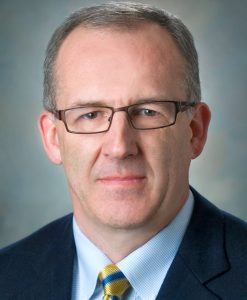SEC Commissioner says Razorback sports, college athletics bring economic value
by December 14, 2017 6:40 pm 962 views

Southeastern Conference Commissioner Greg Sankey told an overflow audience at the Little Rock Chamber of Commerce’s 152nd annual meeting that collegiate athletics brings great “economic value” to major universities such as the University of Arkansas and other SEC schools.
Sankey made his remarks during a question-and-answer session with Little Rock sports personality and former Razorback football player David Bazzel at the chamber meeting. Sankey was asked about the oversized pay packages and parachute deals for college football coaches in the SEC and other major universities.
“I am concerned about that, and I think it would be wrong not to express concern,” Sankey told Bazzel. “But I also balance that any number of lawyers who are affiliated with boards (know) we have anti-trust laws that prohibit the ability to govern the economics of that piece. It is a competitive marketplace for coaches and institutions, and boards of trustees and (university) president leadership … are going to make decisions that are right for that particular setting and they have to have the ability to do so.”
Sankey, who was hired as the SEC Commissioner in June 2015, continued: “We demonstrated that what is happening in the SEC is sustainable. So, don’t forget that while all of our coaches are seeing a big increase, some of those salaries are decreasing but that doesn’t grab the headlines.”
Sankey’s appearance in Little Rock comes only one week after the University of Arkansas hired former Southern Methodist University football coach Chad Morris to lead the Razorback football program. Morris took over for Bret Bielema, who was fired the day after Thanksgiving following the Razorbacks’ 48-45 home loss to Missouri to cap a 4-8 season.
Morris agreed to a six-year contract and he will make $3.5 million annually. Per his employment agreement, he will also be eligible for additional compensation through retention payments and incentives. Morris’ buyout would be $14.7 million should the UA decide to fire him at any time before Dec. 31, 2018. The amount drops incrementally through the following five years, from $12.25 million in 2019, to $3.5 million in 2023.
By comparison, Bielema’s initial contract with the UA was worth $3.2 million annually for six years when he was hired in December 2012. Based on various media reports, Bielema is due between $6 million and $12 million for the University of Arkansas to buyout the remaining three years of his contract.

Sankey told the audience the economics of college football and other athletics are greatly impacted by television contracts that bring in hundreds of millions of dollars to colleges each year. He mentioned the announced deal by Disney to pay $52.4 billion to purchase 21st Century Fox. Sankey said that deal will impact the revenue stream for college athletics because Disney is the parent company of sports and entertainment giant ESPN.
“You have to look beyond the football field in those circumstances,” he said.
To make his point, Sankey described the controversy that reached his Birmingham, Ala.-based office after a Washington Post article noted that an Alabama Crimson Tide linebacker coach made $200,000 more than the university’s president.
“If you read past the first third of that article, and I encourage you to do so, the last two-thirds was about the value created around intercollegiate athletics that are successful, including football, for a university,” Sankey explained. “And I think you see that here … at the University of Arkansas.”
According to Sankey, the SEC distributed an average of about $40 million in fiscal 2016 to its 14 SEC members, totaling around $639 million. That is a 21.3% spike from the previous year when the SEC reported $527.4 million in revenue during the first year of the conference’s TV network pact with the College Football Network.
EMOTIONS OF THE JOB
During his 30-minute Q&A with Bazzel, Sankey also touched on several other topics concerning the business operations of the SEC and UA athletics, including the firing of longtime athletics director Jeff Long, Razorback football games at War Memorial Stadium, and the controversy involving Arkansas’ concealed carry legislation.
Sankey said when he was the former commissioner of the smaller Southland Conference, he was in the room with a former football coach and close friend when he learned the coach would be fired the next day. Because he was so personally close to that coach and his family, Sankey said he had to take a step back from his emotions to do his job effectively.
“I drove home about three hours and I was emotional because I was watching a friend and family and people I care about lose staff and employment opportunities,” said the SEC chief. “The next day I woke up and said, ‘You know, you can’t function in this type of role and be that emotionally attached.’”
He then explained he is good friends with Long and Bielema, but added the business and administration of college athletics constantly evolves and changes, “meaning good people sometimes get fired.” For example, he said when Long was selected to be an original member of the College Football Playoff Selection committee, it was important to the SEC and college football in general.
“Jeff Long was an important representative to the SEC to the College Football Playoff Selection committee and well-respected, but then things changed,” Sankey said. “And now dynamics change around the (football) program, around the university and around the state …”
POLITICS AND GUNS
Toward the end of his appearance before the Little Rock Chamber, Sankey joked that he tries to tread lightly around political issues. When Bazzel asked him about neutral site football games in the SEC and the controversy in Arkansas about playing games at War Memorial Stadium in Little Rock, Sankey said he learned a lesson when he found himself at the center of the Arkansas legislature’s concealed carry debate.
During the 2017 legislative session, Sankey issued a statement expressing concerns about a bill that would expand the list of public places where concealed carry permit holders can carry a firearm, including universities and the State Capitol.
“Well, I want to be careful with this. I stepped into the concealed carry debate in this state, and I will tell you it was a bit surreal,” Sankey said to applause and laughter. “I was watching the stream of the debate on the legislature floor. To be debated on the Arkansas House, it was not something that I ever envisioned in my life.”
In other business, the Little Rock Chamber’s Think Big initiative released several recommendations to improve the overall quality of life for making the city a better place to live for professionals between the ages of 25 and 40. The 12-month project developed a task force across the city that focused on millennials who traditionally have had little input in city policy and government.
The recommendations included developing a master plan for the city’s public transportation system, improving pre-K education opportunities and working with employers on diversity initiatives. Other areas of focus were arts and culture, economic development and public safety and government.
